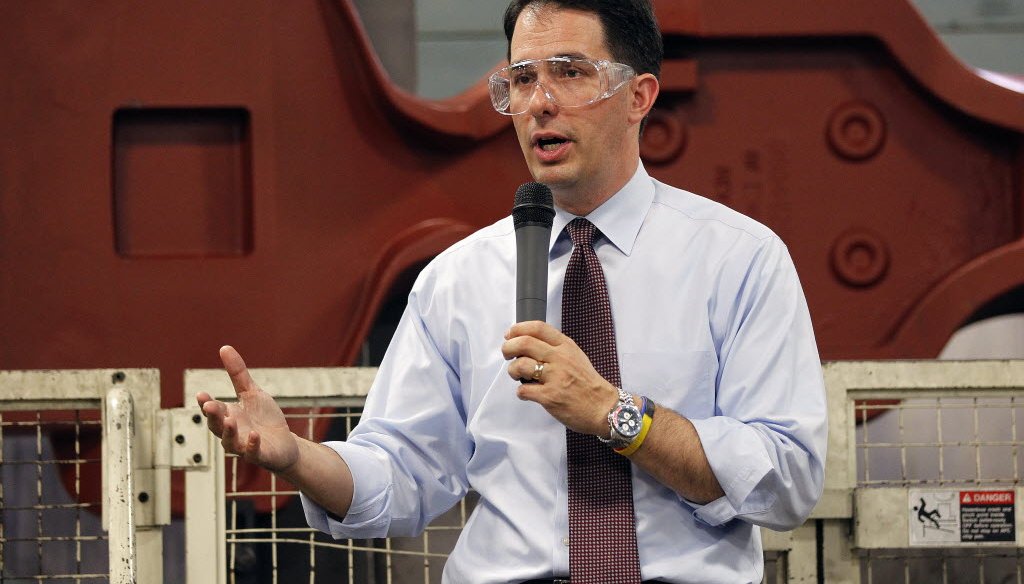Stand up for the facts!
Our only agenda is to publish the truth so you can be an informed participant in democracy.
We need your help.
I would like to contribute

Gov. Scott Walker, shown here in 2014, pledged during his 2014 campaign for a second term to cut taxes, raise certain college grants and cut energy prices during his second term. (Milwaukee Journal Sentinel)
We’re nearing completion of this version of the Walk-O-Meter, which tracks promises made by Republican Scott Walker during his 2014 campaign for a second term as governor
Walker’s second four-year term ends in January 2019, but we’re issuing final ratings ahead of the Nov. 6, 2018, election. In that race, Walker is seeking a third term, challenged by Democrat Tony Evers, the state schools superintendent.
Here, we’re examining three of the four promises that still don’t have a final rating:
-
Work with utilities to reduce the cost of energy for homeowners and employers
Sign up for PolitiFact texts
Our rating was In the Works when we first examined this pledge, in January 2017, halfway into Walker’s second term.
All our Tony Evers and Scott Walker fact checks in the governor’s race.
"Working families" is not a precise term, and the leading authorities on taxes in Wisconsin told us they had not done analyses on taxes on senior citizens. But there had been a series of tax cuts to that point in Walker’s second term, albeit fewer than in his first term.
At that point, the second-term cuts included an income tax deduction worth $20.9 million, starting in the 2016-'17 budget year, resulting from an increase in the standard deduction for married filers. And there was property tax relief worth $213 million, starting the same time, through a reduction in property taxes that were the result of increases in school aids and school levy tax credits.
Property taxes are particularly important to senior citizens on fixed incomes and they clearly are a big bite for working families, including renters who arguably pay them indirectly.
So, what about the second half of Walker’s second term?
Like us on Facebook. Follow us on Twitter: @PolitiFactWisc.
Under Walker’s 2017-’19 state budget, property taxes on the median value home worth $160,600 would remain at roughly $2,851 in the first year, and then would drop $22 the next year, according to the nonpartisan state Legislative Fiscal Bureau.
It’s worth noting that the budget also helps more well-to-do folks. It reduces property taxes on business machinery by $74 million and eliminates the state's $8.5 million alternative minimum tax, which is mostly paid by upper-income taxpayers.
Overall, according to the fiscal bureau, there are some tax increases as well as decreases. But the net change in taxes for the 2017-’19 budget is a drop of $147.4 million during the two-year period. That far exceeds a net increase in fees of $10.6 million.
Tax increases: One of the larger tax increases — $20.3 million over the two years — results from limiting a tax credit that individuals can claim for paying taxes to other states. Also, there is a tax increase of $10.2 million by limiting which people can claim the homestead tax credit.
Tax decreases: The largest tax cut — $180.9 million over two years — comes from eliminating what is known as the forestry tax, which amounted to a state property tax. Another $10 million is cut by repealing what is known as the ambulatory surgical center assessment.
Separately, there are a couple of actions outside of the budget to consider:
Walker and the Republican-led Legislature adopted in April 2018 a tax bill that included a one-time $100 per child tax rebate to parents and a one-time weekend sales tax holiday for all consumers.
In July 2018, Walker said his administration would begin collecting online sales taxes. It’s estimated that will bring in $90 million in the first year. But Walker has said that whatever the amount, income tax rates would be reduced so that there is no net increase in tax revenue to the state.
Finally, another way to think about it: General fund taxes — which includes primarily income and sales taxes, along with miscellaneous taxes — were a total of $133.9 million less during Walker’s second term as a result of tax law changes made under Walker, fiscal bureau director Bob Lang told us.
Our rating
In sum, Walker generally continued to reduce the tax burden during his second term. We rate this pledge Promise Kept.
We initially rated this promise in September 2017. Our rating then was Stalled.
The state Public Service Commission had reduced electricity costs for certain large electricity users by enabling them to pay the lowest going rate in the Midwest. Before that change, these big users were paying regular Wisconsin rates that were higher because, unlike market rates, they fully account for power plants and other investments in the utility's infrastructure.
But now, by and large, electricity costs for business customers and homeowners and renters are higher than in 2014, Citizens Utility Board executive director Tom Content told us. The board advocates for residential and small business customers.
Content noted that customers of one Wisconsin utility, Madison Gas & Electric, will see their electric rates drop by 2 percent in 2019 (though gas prices will rise 1 percent).
In May 2018, the state Public Service Commission, run by three Walker appointees, did order utilities to give customers $140 million in bill credits, ranging from about $2 to $23 for residential customers over the summer and then smaller amounts on a monthly basis for the rest of 2018. But the reason for the credits was Congress’ passage of tax reform in December 2017.
Moreover, the MG&E electricity rate reduction is also the result of the federal tax cuts and the Madison utility taking advantage of price decreases for renewable energy sources, Content said.
Here are figures collected by the Citizens Utility Board comparing 2014 to 2017. They show higher prices in 2017 than in 2014.
Average residential utility bill (gas and electric)
Utility
Total 2014 bill
Total 2017 bill
Dollar Increase
Percentage Increase
Madison Gas & Electric
$96.85
$99.42
$2.57
2.6%
Northern States Power Co. (Xcel Energy)
$79.21
$85.27
$6.06
7.7%
Wisconsin Electric Power Co.
(We Energies)
$91.42
$93.31
$1.89
2%
Wisconsin Power And Light Co. (Alliant Energy)
$76.13
$84.98
$8.85
11.6%
Wisconsin Public Service Corp.
$77.26
$80.56
$80.56
4.2%
Figures collected by the board also show that industrial electric rates (for factories, essentially), increased between 2 percent and 6.2 percent for four of the five utilities from 2014 to 2017. The rate went down 0.1 percent for We Energies.
Meanwhile, according to the board, the statewide average commercial electricity rate was 2.9 percent higher in 2017 than in 2014.
Our rating
Walker said he’d work with utilities to reduce the cost of energy for homeowners and employers. By and large, energy bills are higher in 2017, the latest year for which figures are available, than they were in 2014. So we rate this Promise Broken.
The idea here was to increase higher education grants so more students could afford college; and to target the money to high-demand fields for students who commit to staying in Wisconsin.
All our Tammy Baldwin and Leah Vukmir fact checks in the U.S. Senate race.
Our most recent rating on this promise, in January 2016, was In the Works. That’s when Walker announced a series of higher education initiatives, including two bills sponsored by Republican lawmakers involving grants.
One bill was to increase the needs-based Wisconsin Grants program for technical college students by $500,000 in 2016-’17 and by $500,000 in 2017-’18. It became law in March 2016.
The other bill was to provide $130,000 to University of Wisconsin System two-year colleges and $320,000 to technical colleges to provide emergency grants to help needy students facing difficulties to remain in school. This bill also became law in March 2016.
Our rating
Walker promised to increase higher education grants for certain students and two bills he signed into law during his second term did so. One increases grants to students who suffer financial emergencies and the other increases grants to technical college students. We rate this a Promise Kept.
Our Sources
Email, Gov. Scott Walker press secretary Amy Hasenberg, Oct. 3, 2018
Interview, Wisconsin Policy Forum research director Jason Stein, Oct. 3, 2018
Wisconsin Legislative Fiscal Bureau, tax memo, Dec. 29, 2017
Interview, Wisconsin Legislative Fiscal Bureau director Bob Lang, Oct. 4, 2018
Milwaukee Journal Sentinel, "Gov. Scott Walker signs $76B Wisconsin budget with money for schools, fees for hybrids," Sept. 21, 2017
Associated Press, "Walker signs state budget in advance of re-election run," Sept. 21, 2017
PolitiFact Wisconsin, "Return budget surpluses to taxpayers," Sept. 28, 2018
Citizens Utility Board, "U.S. Rankings: Power Prices In Wis. Are Out Of Whack," September 2018
Interview, Citizens Utility Board executive director Tom Content, Oct. 4, 2018
Wisconsin State Journal, "Wisconsin utilities to return $140 million to customers," May 26, 2018
Interview, Wisconsin Legislative Fiscal Bureau program supervisor Paul Ferguson, Oct. 5, 2018


























